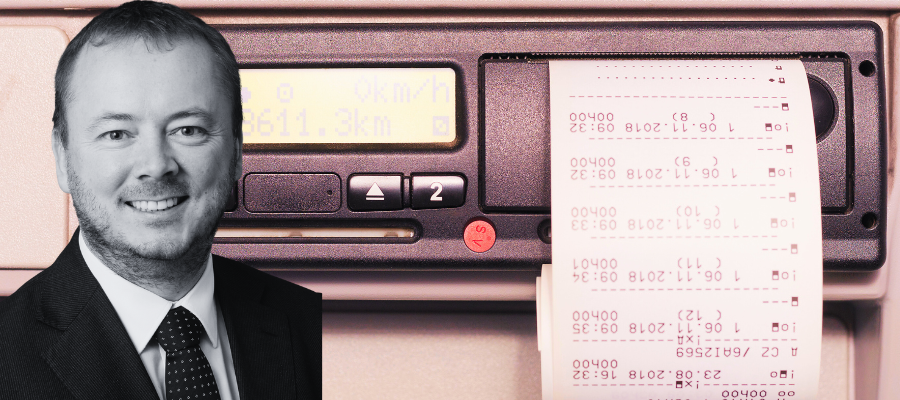🕒 Article read time: 2 minutes
Keeping up with tachograph compliance a “key responsibility”, says Logistics UK

Logistics businesses are essential to supporting the UK economy and providing security to our supply chains.
Road safety and compliance are a high priority for all transport operators, and staying up to date with legislation keeps their vehicles on the road, and our country moving.
Logistics businesses are essential to supporting the UK economy and providing security to our supply chains. Road safety and compliance are a high priority for all transport operators, and staying up to date with legislation keeps their vehicles on the road, and our country moving.
Tachographs are a vital element of road transport operations and therefore it is essential that both the operator and business employer comply with the regulations.
“Legislation states that all commercial vehicles weighing above 3,5 tonnes first registered on, or after, 1 May 2006 must be fitted with digital tachographs,” says Chris Yarsley, Senior Policy Manager - Road Freight Regulation at Logistics UK.
“The UK introduced smart tachographs on 15 June 2019, with new vehicles – including European - first registered from this date legally required to have a smart tachograph fitted.”
LOCATION STAMPS
Smart tachographs include a Global Navigation Satellite System (GNSS) source to produce a location stamp at start and end of driving, as well as at three-hour intervals. It also includes a wireless enforcement function which communicates with enforcement officers alerting them to possible manipulation (but not driving and break data) or malfunctions with the device, and the integration with Intelligent Transport Systems (ITS) such as telematics equipment.
“It is a key responsibility for businesses to keep up to date with all aspects of operational compliance, including the retained EU and GB domestic driving hours rules,” continues Yarsley.
SMART COOKIES
Later in 2023, the roll-out of the updated smart tachograph will begin, which will allow authorities to control and enforce additional legislation in road transport, cabotage and posting of workers.
The new model will implement a basic Geographic Information System (GIS) of national borders to register the position and time of a border crossing. However, this will be delayed due to operational difficulties in authentication of the satellite signal.
TACHOGRAPH HISTORY
In 2020, amendments to the tachograph rules were made by the European Institutions regarding driver requirements for recording other work whilst away from the vehicle.
As the amendments took place during the transition period following the formal departure from the EU, the UK must also comply with these new rules. Under the new rules, drivers are obliged to produce and present a full set of tachograph records for the current day and the previous 28 days at the roadside.
All activity including driving, out of scope driving and other work must be recorded, as well as inactivity, such as breaks, rest periods and sick leave. The record of work must be either written manually on a chart/print roll from a digital or smart tachograph or made by using the manual input facility of a digital or smart tachograph.
SIGNIFICANT BARRIER
“Logistics UK is calling on the Department for Transport (DfT) to reverse this legal requirement and revert back to the legal text in place before the 2020 change took place,” says Yarsley. “As we believe the 28-day requirement has become a significant administrative barrier for occasional drivers.
“Due to the long manual process of making manual entries for the 28-day period,” he continues, “operators report that their drivers, or other staff who hold a vocational licence, are choosing not to take on last minute and/or emergency works as the process is long and drawn out and not simple. Other operators have reverted to using analogue charts to record each day’s activity, which is not practical for everyday use. We can see the repercussions this has within the logistics industry in the form of staff and driver shortages, especially during the pandemic.”
COMMON QUERY
The Member Advice Centre (MAC) within Logistics UK has reported that the 28-day issue holds the highest number of complaints. Over the last 12 months (April ’22 – April ’23), drivers’ hours and tachograph questions made up around a fifth of the queries received. Of these, around 15% of the queries received have been related to occasional drivers and recording manual entries. Queries relating to the 28-day records, especially for occasional drivers, became popular in 2022 as enforcement of the requirement started and has been the most common query still to date.
“Road compliance and legislation can, at times, be overwhelming to navigate,” says Yarsley. “Logistics UK recognises that businesses and transport operators may not have a full understanding of vehicle compliance and legislation, and therefore offers various tachograph services – at competitive pricing - which provides drivers with a complete bespoke solution to support them.”
The tachograph services compromises of tachograph analysis, tachograph on-site/remote compliance service and tachograph contract management, and offer tailored solutions to suit company size, operational processes and individual needs.
For more information on Logistics UK’s tachograph services, please visit logistics.org.uk/tachograph-services
*www.logistics.org.uk/mac
Published On: 11/05/2023 16:00:05

Comments Section
If you are a Logistics UK member login to add comments.